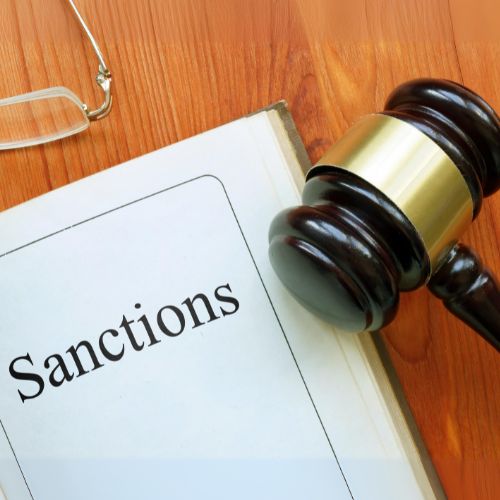
International Sanctions
International sanctions are powerful tools used by countries or organizations to pressure governments into changing policies or behaviors. In Nigeria, sanctions imposed by international bodies and nations have had profound effects on the country’s political climate. This guide explores how these sanctions influence Nigeria’s political landscape, breaking down the concept in clear, easy-to-understand terms. We’ll examine the direct and indirect consequences of sanctions on governance, economy, and the lives of ordinary Nigerians.
What are International Sanctions?
International sanctions are punitive measures taken by countries or organizations to influence the actions of another nation. They can take various forms, including economic restrictions, travel bans, or arms embargoes, often in response to human rights abuses, political instability, or security concerns.
Types of International Sanctions:
- Economic Sanctions: Restrictions on trade, investments, or access to financial markets.
- Diplomatic Sanctions: Reduction or suspension of diplomatic relations.
- Travel Bans: Prohibiting government officials or certain individuals from entering other countries.
- Arms Embargoes: Restrictions on the sale or transfer of weapons.
Economic Consequences of Sanctions in Nigeria
One of the most immediate and visible impacts of international sanctions is economic. These sanctions often target industries or financial sectors, limiting the government’s ability to engage in international trade and secure investment, which can have a ripple effect throughout the economy.
Reduced Foreign Investment
Sanctions that limit Nigeria’s access to international markets have a chilling effect on foreign investment. Investors tend to avoid countries under sanctions, as these conditions create an unpredictable business environment. This lack of investment stifles economic growth, slows job creation, and increases unemployment.
Impact on Key Industries
Certain industries, such as oil and gas, which are central to Nigeria’s economy, can be significantly affected by international sanctions. Restrictions on the export of oil, for instance, reduce government revenue, forcing budget cuts in critical areas such as infrastructure development, healthcare, and education.
Currency Devaluation and Inflation
Economic sanctions can lead to currency instability. When Nigeria’s access to international financial systems is restricted, the local currency often devalues, leading to inflation. As prices rise, the purchasing power of everyday Nigerians diminishes, increasing the cost of living.
Political Consequences of International Sanctions
International sanctions do not only impact Nigeria economically; they also exert significant pressure on its political system, influencing both internal governance and international relationships.
Increased Political Pressure
Sanctions are often imposed to push governments into adopting democratic reforms, addressing human rights violations, or resolving security issues. In Nigeria, international pressure can lead to increased scrutiny of the political class and demands for accountability. This can sometimes lead to government concessions, including political reforms or changes in leadership to appease international bodies.
Government Legitimacy and Public Perception
Sanctions can undermine the legitimacy of a government both internationally and domestically. If a government is seen as the cause of sanctions due to corruption, human rights abuses, or failure to manage conflict, it can lose support from the public. This creates tension between the government and its citizens, sometimes leading to protests, political unrest, or shifts in public opinion.
Strained Diplomatic Relations
Sanctions can strain Nigeria’s diplomatic relations with sanctioning countries and international organizations. These strained relationships can lead to Nigeria’s isolation on the global stage, making it difficult to negotiate trade agreements, receive development aid, or participate in international initiatives.
Social Impact of Sanctions on Nigerian Citizens
Beyond the political and economic realms, international sanctions also have direct effects on the daily lives of Nigerian citizens, particularly the most vulnerable populations.
Increased Poverty and Unemployment
As sanctions limit economic growth and foreign investment, unemployment rates rise, and poverty becomes more widespread. This particularly affects marginalized communities, exacerbating inequality and increasing reliance on informal economies.
Limited Access to Resources and Services
Economic sanctions can make it difficult for Nigeria to import essential goods, such as medical supplies, food, or technology. This can lead to shortages of critical resources, affecting healthcare services and making it harder for citizens to access basic needs.
Humanitarian Impact
In extreme cases, sanctions can lead to humanitarian crises. If sanctions are not carefully targeted, they can inadvertently harm civilians, limiting access to food, healthcare, and other essential services. This can increase mortality rates, exacerbate health crises, and lead to a decline in overall well-being.
Challenges to Reform and Resistance to Sanctions
While sanctions are intended to promote change, they can sometimes have the opposite effect, entrenching the positions of political leaders or strengthening anti-Western rhetoric in the country.
Strengthened Nationalism and Anti-International Sentiment
Sanctions can sometimes foster nationalism, as political leaders position themselves as defenders of national sovereignty against foreign interference. This can make it harder to achieve the intended reforms, as leaders may resist change in order to maintain power and defy international pressure.
Political Elites Shielded from Sanctions
Sanctions, particularly those that target the economy as a whole, may hurt ordinary citizens more than the political elites they are intended to pressure. In some cases, corrupt officials or politicians find ways to evade sanctions, continuing their activities while the general population suffers the consequences.






